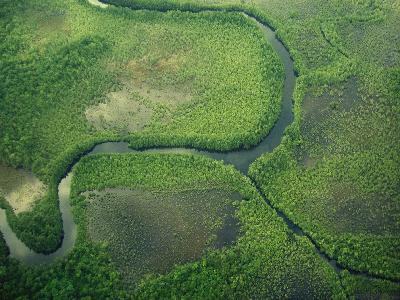|
 |
|
The Niger Delta |
Oil was first discovered in the Niger Delta in 1956, and drilling began not long after. But excitement over the wealth "black gold" would bring to Nigeria waned as the effects of oil spillage caused by neglect, mismanagement and sabotage of pipelines began to take their toll. According to the country's Department of Petroleum Resources, between 1976 and 1996, 4,647 incidents resulted in the spill of approximately 2.37 million barrels of oil into the delta's mangrove-filled wetlands and the Atlantic Ocean. Only 549,060 barrels of this – just 23 percent – was recovered through cleanup efforts. Since the late 1990s, pipeline problems have persisted, and more oil has joined the nearly 2 million barrels still soaking into the region's ecology. Unfortunately, when it comes to cleaning up oil spills, time is of the essence. Oil thins out the longer it remains in water – a huge obstacle when it comes to collection by cleanup crews. Once coated in hydrocarbons, plant, animal and aquatic life will suffocate; there is a limited window for rescue.
In the delta, immediate response to an oil spill involves a variety of equipment. Clean Nigeria Associates Limited is Nigeria's first non-profit spill-response organization and has been a major presence in clean-up efforts in the region since the 1980s. It starts an operation by setting up containment booms (large floating barriers) around the broken pipeline. These help to concentrate the gush of petroleum in one area, so that it can be collected by floating skimmers, crafts that pick up oil. Sorbents, essentially large sponges, are also spread out to soak up oil in the water.
These tools work best when crude is still thick and glob-like. As it inevitably thins, additional methods are needed. In other situations, like the current Deepwater Horizon spill in the Gulf of Mexico, chemical dispersants that act like cleaning detergent are employed. However, according to Nigeria's National Petroleum Corporation, these can only be used offshore, and only after other cleanup methods have been exhausted. Because their long-term effects on biological life are unknown (aside from their toxicity to coral), dispersants aren't used in the wetlands of the Niger Delta.
The larger, more pressing issue is how to handle the millions of barrels of spilled oil from the last 50 years. Immediate response technology isn't applicable, but science may be.
Bioremediation is a process that uses microorganisms and plant life to heal environments contaminated by oil. In the delta's case, two plants, kenaf and vitiver, have been vital to restoring delicate mangrove and wetland areas. Native to West Africa, kenaf leaves are highly absorbent. Once saturated with oil, the plants are taken away to be infiltrated with microorganisms that break down hydrocarbons. Vitiver, a perennial grass with fibrous, long-reaching roots, is then planted in affected areas. It has high chemical tolerance and, more importantly, it works as a soil decontaminant.
Various Nigeria-based NGOs have been working with the plants in small-scale projects over the last decade. One in particular, the Center for Environmental Resources and Sustainable Ecosystems, has had marked success with a project it spearheaded in 2002. While bioremediation is certainly a sustainable and long-term solution, whether it can be applied across the Niger Delta remains to be seen. Hopefully more progress will be made before another 50 years pass.
Tech Bytes
➲ Malawi President Bingu wa Mutharika announced in June that the Chinese Government will fund the construction of a new science university in the southern Thyolo district. He said the new institution would offer courses in health and medical sciences, applied engineering and technology, earth and climate change sciences and cancer research, as well as other disciplines.
➲ The UN Economic Commission for Africa has set up a fund dedicated to encouraging scientific innovation in Africa. The new fund has so far received more than $500,000 from African organizations. Under the plan, two new bodies, the African Science, Technology and Innovation Endowment Fund and the African Science to Business Challenge, will aim to motivate inventors and innovators to turn their ideas into entrepreneurial success.
➲ A revolutionary new tool is set to be used in the livestock industry: zebra scent. Scientists from the International Center of Insect Physiology and Ecology have developed a zebra-scented collar, which will be worn by cattle across Africa to repel tsetse flies. The collars contain synthetic equivalents of the odor from zebras, which tsetse flies generally avoid. Bites from tsetse flies spread sleeping sickness among certain livestock, killing 3 million cattle each year. |